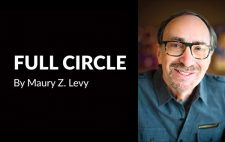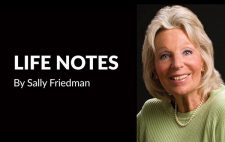Faleeha Hassan wants to write about love. She wants to write about family, motherhood, womanhood.
But when she tries to write about her parents’ love, it becomes a story of a husband forced to fight a war he doesn’t believe in. When she tries to write about family, the story is about cousins, neighbors and friends who never came home. It is the story of a mother who had to leave her two eldest children behind to save the lives of the two youngest; a woman who left the only life she’d ever known for her only chance at survival.
Hassan’s modest Washington Township apartment seems unfit for a woman of her accomplishments. In 1991, she became the first woman in her city – Najaf, Iraq – to publish a book of poetry. She was the first woman in the country to publish a children’s book. Six professors in three Middle Eastern nations have overseen masters theses based on her writing. In all, Hassan’s catalog of work includes 17 books, several plays, novels and many short stories. Her work has been translated into 14 languages and published in at least as many countries. She has been touted by literary critics as “The Maya Angelou of Iraq.”
“I became a famous woman there, and it is not easy to do that,” says Hassan, 50. “Even in 2016, women cannot write poetry. When I published my first book, I was married and I had some gold from my family. I used that gold to print 5,000 copies. After three months, they had all sold. My parents were proud to see me become a famous writer.”
The cover of that first collection of poetry, called “Because I Am A Girl,” featured a woman with her hair uncovered by a hijab. Hassan, a Muslim who wears a hijab in public, says many people thought the image was shameful, but far more were simply intrigued.
“At first, my book was being published outside my country in places like Sweden and Austria,” she says. “When that first book was published in Najaf, I had a book signing. Many different people were coming, because they wanted to know, ‘Who is this woman?’ One time I was on the bus and someone pointed at me and said, ‘Because she is a girl!’ I couldn’t believe he had read my book. The cover is a woman with no scarf. It’s because I wanted to describe my soul.”
Although Hassan has never used her work to comment on politics, she cannot seem to get away from the themes of war. All her life, she says, war has been the only constant.
“When I want to write about myself, I can’t without writing about my experience,” she says. “My experience is all about war. I believe I am a witness for war. This is my story. When I was a teenager, the principal came to our class and said he was closing the school down, just for 10 days, until the Iran-Iraq war was over. That was in 1980, and that war did not end until 1988.”
During those years, Hassan’s father was drafted and sent into combat. Her mother missed him so much, she became physically ill.
“They truly loved each other,” Hassan remembers. “I wrote many, many poems about my mother and father. My father was gone for so long, my mother went into the hospital. I was there with her, and I didn’t know what to do to help her. I left the hospital and went to the front lines to find my father to bring him her letter. I went by myself, and I saw people die all around me. When I got back I could not tell my mother what I had seen.”
Though Hassan’s father came home from that war, it wasn’t long before her brother was sent off to fight in another. He came back too, but when he did, Hassan says, he was not the person she’d known.
“When that first war ended, another war started with Kuwait,” she says. “This time it was my brother they sent. Later, he and the other soldiers walked across the desert for days and days to come home. He got home, and the same day the police came and took him to jail. They said he was a deserter. We didn’t know anything about him in the time he was gone. We couldn’t visit. We couldn’t even be sure where he was. When he came home, he was not the same. He told me many people died in the jail. They starved to death or were executed. We could not take him to a doctor. In our culture, depression is a shame.”
Though she married and had four children, every one of Hassan’s memories of home is tinged with horror and bloody images she says she will never be able to forget.
“We lived with the sound of Apache [helicopters] every day,” she says. “Most of the time we had no electricity, no water, no food. I saw dead bodies in the street being eaten by dogs. It is not easy to live with war in your life. When I want to write about myself, I find a war. This story never stops. All my friends have been killed or are still missing. All my cousins, too. My aunt had six sons; every one killed in war. Some of their bodies never came back. I try to write about love, but my pen starts crying. I always have in my mind these experiences of war.”
Hassan continued to publish, predominantly in countries outside Iraq, but in her country, she says, it became more and more dangerous to be a female author.
“I’m not saying I was some kind of hero under Saddam [Hussein, president of Iraq from 1979 to 2003], and I wrote out against him,” Hassan says. “You could not. You could not even whisper to your husband against Saddam. But it is dangerous even if you don’t stand out, and I did.”
In 2011, Hassan found her name on a “death list” circulated by local militants and felt she could no longer risk her own life or the lives of her children. She’d divorced her husband (now missing in Iraq, as far as Hassan knows), and her two oldest children were married and beginning families of their own in Najaf. Her two younger children – Zahraa and Ahmed, now 16 and 14 – joined their mother as she fled to Turkey.
“I submitted my papers to the U.N. [High Command for Refugees] to be resettled,” she says. “There was nowhere in particular I wanted to be sent, as long as it was safe and far away from Iraq. They called me and said, ‘Your papers have been accepted for the USA. You have any friends or family there?’ I said no. Catholic Charities brought us here.”
By 2012, Hassan and her youngest children were safely in the United States, but their struggle was far from over.
“A week after we came here, my daughter was very sick and I had no way to speak with other people about it,” says Hassan. “Every country, every city, has its own rules, and ours were different, different, different. I did not know the rules here or how to get her to a doctor. This made me angry with myself. It made me sad. We walked together to the hospital, and I told myself I needed to learn the language.”
Hassan threw herself into English classes and joined the Society for Poets of Southern New Jersey, where she met Jewish poet David Steinberg. Together the poets visit libraries and community centers, hosting discussions about peace. Hassan translated Steinberg’s poem “My Enemy in the Mirror” into Arabic and arranged for it to be published in Gaza. She says it is the first poem by a Jewish writer to be published there.
Hassan holds a master’s degree in Arabic language from the University of Kufa and has 24 years of experience as a public school teacher. Once she has finished mastering the English language, she hopes to go back to teaching.
“I’d be happy to be a teacher again,” she says. “Or do any job where I can help people like me, who are coming here with nothing. I don’t have any money to help them, but I will have my language, and I will have my writing, and I will help.”












